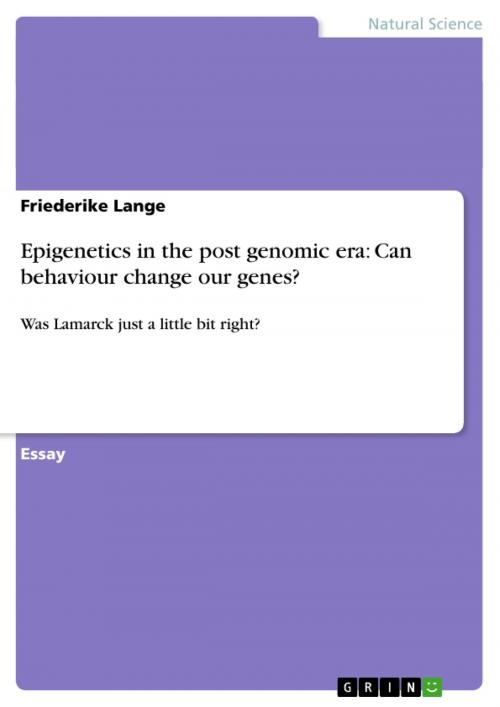Epigenetics in the post genomic era: Can behaviour change our genes?
Was Lamarck just a little bit right?
Nonfiction, Science & Nature, Science, Biological Sciences, Genetics| Author: | Friederike Lange | ISBN: | 9783656014874 |
| Publisher: | GRIN Verlag | Publication: | September 26, 2011 |
| Imprint: | GRIN Verlag | Language: | English |
| Author: | Friederike Lange |
| ISBN: | 9783656014874 |
| Publisher: | GRIN Verlag |
| Publication: | September 26, 2011 |
| Imprint: | GRIN Verlag |
| Language: | English |
Essay from the year 2011 in the subject Biology - Genetics / Gene Technology, grade: B2, University of Glasgow (Biology - Genetics), course: Genetics BA - Level 3, language: English, abstract: Traditionally, genomic research was focused on the investigation of DNA sequence which gives rise to the diversity of phenotypes found in nature. It was undoubted that the information which is given by the genomic sequence is the sole factor which is important for the outcome for each individual organism. But since a few decades, a new concept called epigenetics has arisen and shows that we have to modify our knowledge about genetics. 'Epi' derives from Greek meaning 'on' or 'over' and implies that epigenetic mechanisms act on genes via altering the gene expression and regulation without modifying the actual DNA sequence. In epigenetics, we can find the reason why twins (who have the exact same gene sequence) can alter in their phenotype especially concerning their susceptibility to diseases (Fraga et al. 2005; Wong et al.; 2005). Furthermore, it has the potential to answer the question how phenotypic characteristics can alter between generations without a change in the underlying genetic material.
Essay from the year 2011 in the subject Biology - Genetics / Gene Technology, grade: B2, University of Glasgow (Biology - Genetics), course: Genetics BA - Level 3, language: English, abstract: Traditionally, genomic research was focused on the investigation of DNA sequence which gives rise to the diversity of phenotypes found in nature. It was undoubted that the information which is given by the genomic sequence is the sole factor which is important for the outcome for each individual organism. But since a few decades, a new concept called epigenetics has arisen and shows that we have to modify our knowledge about genetics. 'Epi' derives from Greek meaning 'on' or 'over' and implies that epigenetic mechanisms act on genes via altering the gene expression and regulation without modifying the actual DNA sequence. In epigenetics, we can find the reason why twins (who have the exact same gene sequence) can alter in their phenotype especially concerning their susceptibility to diseases (Fraga et al. 2005; Wong et al.; 2005). Furthermore, it has the potential to answer the question how phenotypic characteristics can alter between generations without a change in the underlying genetic material.















